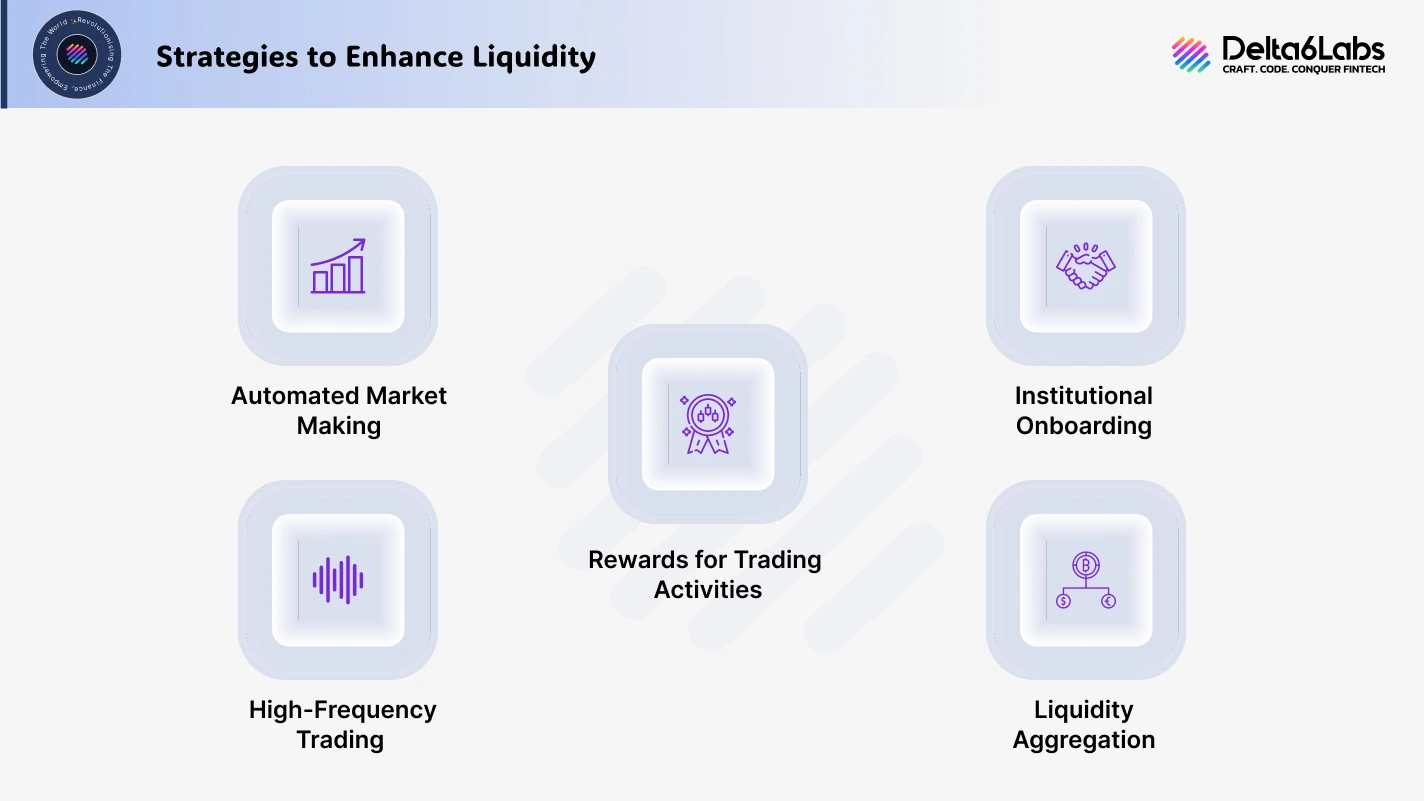Liquidity in Crypto Exchanges: Why Does It Matter?
Table of Contents
Multiple factors decide the fate of a crypto exchange, such as its UX design, fee structure, compliance mechanisms, and most significantly, Liquidity management. Liquidity is the spine of a successful crypto trading platform. In its absence, users will have to face slippage and price volatility in the crypto market.
If a cryptocurrency exchange has low liquidity, it will likely fail to attract institutional investors. On the other hand, crypto exchanges with robust liquidity management tend to have a larger user base and higher transaction volume. But what exactly does liquidity mean in crypto exchanges? How does it impact the overall performance of a crypto exchange? In this article, we will explore the concept of liquidity and its impact on cryptocurrency exchanges.
What is Liquidity in Crypto Exchanges?
Liquidity in crypto exchanges represents the ease with which assets can be bought and sold without any substantial variation in the price. It is a prominent aspect of the crypto market because it has a critical impact on the speed and ease of transactions. Liquidity contributes to market stability, as high liquidity implies a dynamic market where crypto assets can be bought, sold, or exchanged rapidly.
Factors Affecting Liquidity in Crypto
Factors that affect the liquidity in crypto exchanges are:
Regulatory Environment
The legal and regulatory framework has a critical impact on liquidity in crypto exchanges. A crypto-friendly and clear regulatory framework builds confidence among investors and brings more capital, thus improving the stability of the crypto market. Restrictive crypto laws have a negative impact on liquidity because investors lack confidence to invest capital in the crypto market.
Exchange Listings
The exchange listing of a cryptocurrency is a primary factor that affects its liquidity. If a cryptocurrency is listed on a popular and credible exchange with high trading volume, then the chances of its liquidity being in a better state are higher.
Trade Volume
Trading volume plays a crucial role in maintaining liquidity in a cryptocurrency market. Higher trading volumes enable seamless and smooth transactions, allowing buyers and sellers to participate in trades more easily.
Number of Active Participants
A crypto market, having a large number of traders and investors, provides more liquidity to users compared to a market with fewer participants. A high number of traders indicates that the exchange has a stable and steady flow of buy and sell orders.
Market Sentiments
Market Sentiments have a significant impact on the liquidity levels in both bullish and bearish situations. In positive sentiments, traders may buy, which will increase liquidity. On the other hand, during periods of negative market sentiment, trading activity may decline, leading to a reduction in liquidity.
Market Structure
Several factors, including order book depth, bid-ask spread, and trading volume distribution, significantly impact liquidity. A deep order book with tight bid-ask spreads represents high liquidity, and a shallow order book indicates lower liquidity.
Importance of Liquidity
Stop Price Manipulations
Liquidity plays a crucial role in mitigating the risk of market manipulation by pessimistic individuals and groups. If the liquidity of any crypto asset is high, then it will be extremely tough for any individual to control its price.
Offers Stability
A Market with high liquidity is considered stable and less vulnerable, because high liquidity implies that the platform has substantial trading activity and higher trading volumes.
Trader’s Behavior Analysis
The behavior of a trader determines the liquidity of a cryptocurrency. As the number of participants increases, so does the liquidity. A larger number of buy and sell orders reduces market volatility, providing a detailed picture of market forces. In a highly liquid and stable market, investors can make precise predictions and take better decisions.
Lower Slippage
Slippage occurs when the price changes between the time the order is placed and the time it is executed. High liquidity reduces slippage, allowing you to obtain a price closer to your expectations.
Strategies to Enhance Liquidity
Crypto exchanges utilize multiple strategies to enhance liquidity, such as:
Automated Market Making
Most market makers use automated algorithms and crypto trading bots to manage their buy and sell orders in the cryptocurrency market. These bots are quicker than humans and are available at any time. They can respond rapidly to market conditions by placing orders at optimal prices and adjusting the bid-ask spread in response to market volatility.
High-Frequency Trading
There is a high chance that cryptocurrencies, trading pairs, and assets listed on various crypto exchanges have slight price differences. Traders engage in high-frequency trading to capitalize on this price discrepancy. Advanced algorithms are used to execute large numbers of trades per second, generating small profits on each trade, which ultimately leads to a significant profit over the total volume.
Rewards for Trading Activities
Incentives are the game-changer in enhancing trading activities on a crypto trading platform. If a crypto exchange provides low-fee, staking options, and token-based rewards, then the chances of a spike in high-volume trades are inevitable. Incentives enhance liquidity, improve stability, and reduce slippage. Offering rewards for trading activities can attract more participants, benefiting both the platform and its users.
Institutional Onboarding
If a platform aims to establish deep liquidity, it must encourage activities that attract institutional investors to the platform. These investors bring substantial trading volumes and contribute to market stability. However, to attract such investors, the platform needs to implement regulatory compliance mechanisms, custody and security solutions, including cold storage, multi-signature authentication, and OTC trading desks.
Liquidity Aggregation
Crypto exchanges aggregate liquidity through various sources because it helps improve price discovery, reducing slippage, and sustaining in the market among more established and popular exchanges. The sources through which liquidity can be aggregated include connection with global liquidity pools, smart order routing (SOR), and cross-exchange liquidity sharing. Delta6Labs offers liquidity management tools that enable crypto exchanges to maintain optimal liquidity.

Challenges in Crypto Liquidity
Cryptocurrency exchanges worldwide face multiple challenges in maintaining liquidity on their platforms. Some of these challenges are as follows:
Market Manipulation
Many Cryptocurrency exchanges mislead investors to bring them to the platform by hiding their actual liquidity and opting for artificial volume inflation. There are some other tactics, such as spoofing and pump-and-dump schemes, that also damage the credibility of the exchange.
Institutional Pessimis
The crypto market is still in its development stage, which is why some investors remain hesitant before investing in crypto assets. Liquidity risks, security concerns, and regulatory framework issues, such as the absence of AML/KYC protocols, are some challenges that deter institutional investors from investing in crypto exchanges.
24×7 Market Structure
Unlike traditional stock markets, the crypto market is open 24*7, which requires constant liquidity management. There are some low-activity windows as well, when the price volatility increases, in that period, automatic liquidity solutions are needed to tighten the spreads and maintain the liquidity.
Take Away
Multiple factors play a crucial role in the success of a crypto exchange, including liquidity, which is one of the most significant aspects of a crypto exchange. Investors want to put their capital in crypto exchanges offering high liquidity because higher liquidity means stability and steadiness. Liquidity is generally referred to as the ease with which traders can buy or sell crypto assets without much price variation.
High liquidity makes trades smooth and seamless, and the risk of price manipulation decreases. Several factors influence the liquidity of a cryptocurrency exchange, including trading volumes, market sentiment, market structure, and the number of participants. Crypto exchanges employ various strategies to address these issues. Some of these strategies are automated market-making, liquidity aggregation, high-frequency trading, incentives for trading activities, and institutional onboarding.
As the cryptocurrency landscape continues to evolve, focusing on liquidity will be crucial for exchanges seeking to differentiate themselves in a competitive market. Ultimately, a well-handled liquidity framework not only helps exchanges thrive but also empowers traders by ensuring they have access to a more reliable and efficient trading experience.
Frequently Asked Questions
Disclaimer:
The information on this blog is for knowledge purposes only. The content provided is subject to updates, completion, verification, and amendments, which may result in significant changes.
Nothing in this blog is intended to serve as legal, tax, securities, or investment advice of any investment or a solicitation for any product or service.






